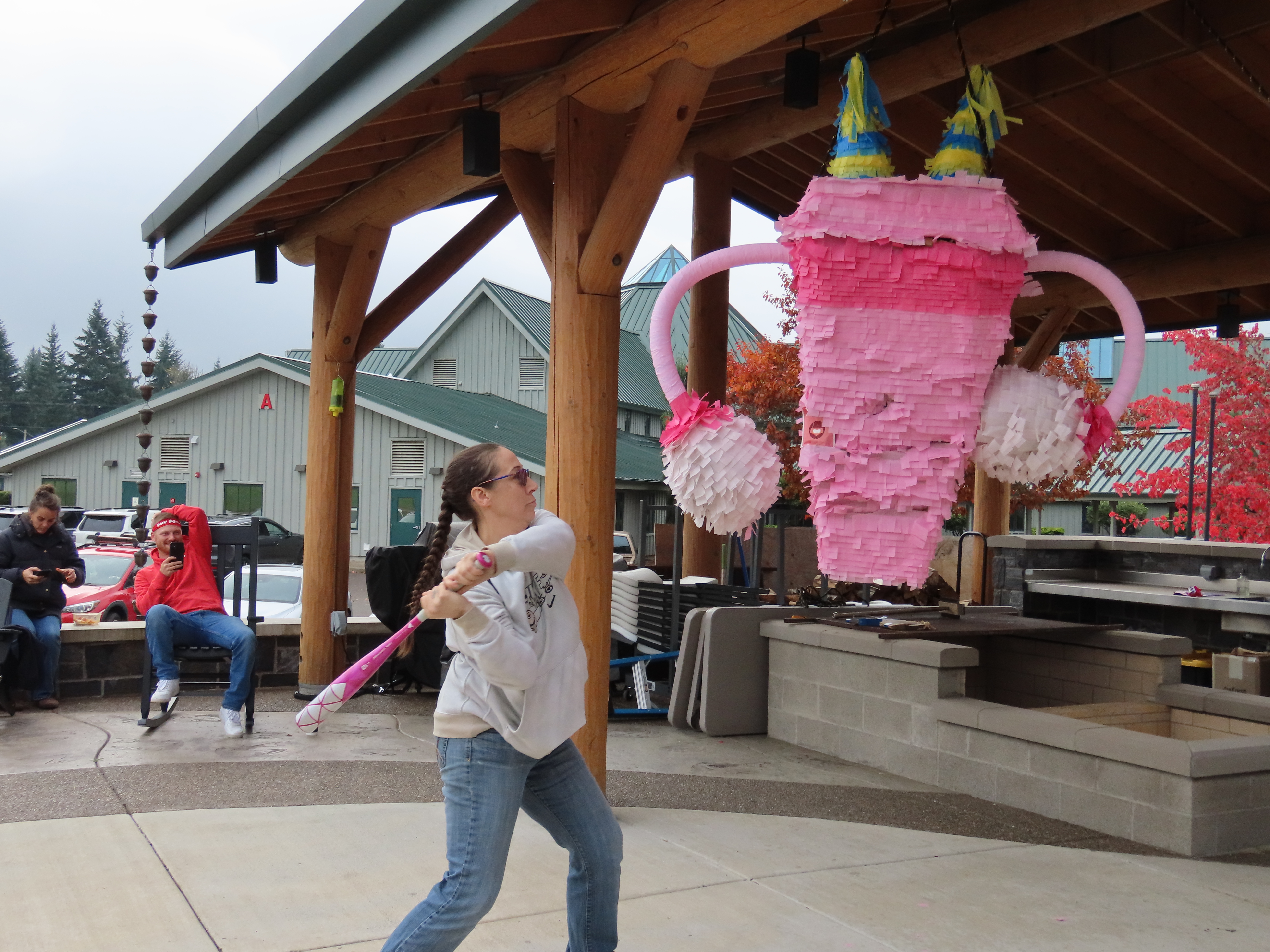Health & Education
Hot Flash Bash presents information, different views of menopause

By Nicole Montesano
Smoke Signals staff writer
Although menopause is often treated as something between a joke and a medical problem in the United States, many cultures regard it as an important and deeply meaningful life transition, displays at the Tribe’s first Hot Flash Bash pointed out.
Organizers at the Thursday, Oct. 23, event at the Cheryle A. Kennedy Public Heath Building said they wanted to both provide helpful information and hear about what attendees want to see from future events. Along with giveaways of self-care items and pamphlets, the event included a uterus-shaped piñata, lunch and a table where participants could write down what they’d like to see at future events. There was also a fuzzy toy stuffed uterus offering hugs.
But there was an important point underlying the playfulness: Women need not suffer symptoms in silence and they don’t have to regard themselves as in decline – indeed, in many traditional cultures, older women are seen as powerful and important members of society.
One display showed a map with write-ups on the views of women and society in a variety of cultures from around the world, including Indigenous Tribes in this country.
For example, one of the write-ups said, “among the Haudenosaunee Confederacy – comprising the Mohawk, Oneida, Onandaga, Cayuga and Seneca nations – post-menopausal women hold positions of deep respect and leadership. … Menopause, therefore, is not viewed as decline but as a sacred passage into power and communal responsibility.”
Similar views are held elsewhere.
“For the Maori of Aotearoa (New Zealand), menopause represents a powerful transition from community member to spiritual Elder,” another write-up said. “It signifies entrance into a revered stage of life where her influence and guidance sustain both family and community wellbeing.”
That contrasts sharply with the view of mainstream society in the U.S. and Canada, where menopause is “most often viewed through a biomedical lens encompassing both the end of menstruation and the broader process of female midlife aging,” another write-up said. “Western medicine has long characterized this stage as a biological decline, marked by hormonal depletion and symptoms such as hot flashes, night sweats, depression and anxiety. These experiences are often tied to a perceived loss of youth, fertility and sexuality.”
A vivid painting of an orca called attention to the fact that, while among most mammals, the reproductive years comprise the entirety of female adulthood, there are exceptions. Orcas and four other species of toothed whales also go through menopause, living for decades afterwards, and the grandmothers are considered an important part of the whales’ society. For example, the Center For Whale Research says, grandmother orcas teach the younger pod members where and when to find food, especially when it’s in short supply, protect their sons from potentially fatal social disputes and help raise their grandchildren.
Women of all ages attended the health fair, browsing the tables and chatting with department representatives.
Tribal member Caitlin Zimbrick said she had come partly “because my grandma is here and I adore her,” adding “And I’m almost 40, and I figured it was not too early to start gathering information.”
Her sister-in-law Amber Zimbrick said she had come “because of my raging, out-of-control hormones. And to see Grandma.”
Attendees were asked to write their suggestions for future menopause events on paper cutouts of orcas and add them to the painting.
Tables provided information on both traditional and modern medicine and various programs that might prove helpful in later years, including handouts on diabetes and menopause, brain health, emotional and mental wellness, and Elder justice.
Traditional Indigenous medicines and ceremonies can offer a complement to modern medicine, handouts from Peer Support Specialist Tannith McNeel said, and people deserve to be respected for their health choices. The handouts advised bringing an advocate to medical appointments and working together with medical providers to review potential interactions of herbs with prescription medications, and to plan care that respectfully integrates traditional practices. Not all traditional medicines have been studied with randomized trials. “Lack of a randomized trial does not equal lack of value,” one handout noted.
Risk of diabetes can increase with menopause and the Tribe offers numerous classes and programs for those living with diabetes, managing meals and other skills, including a 24-hour nurse advice line at 1-800-970-7138.
Tribal member Nicole Hewitt, a contracted clinical supervisor with behavioral health, said it’s important for women to realize that menopause “is not an ending; it’s just the next chapter.”
Still, she noted, it can bring out a lot of feelings, and tending to mental wellbeing is as important as maintaining physical health.
As many as one in three Native American Elders may develop Alzheimer’s or another form of dementia, according to a handout from the Community Health Department. The Tribe offers community-based screening, and support through diagnosis and figuring out next steps.
The Tribe also offers an Elder Justice Program to “ensure our Elders are allowed the space where they are respected, cared for and supported with the ability to maintain their voice through advocacy, education and support,” according to the Community Health Department handout. It said that Elder abuse is common, often by family members, with some studies suggesting it may affect one in three Native Elders.
